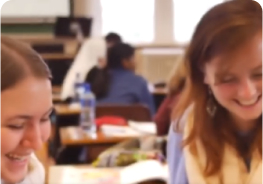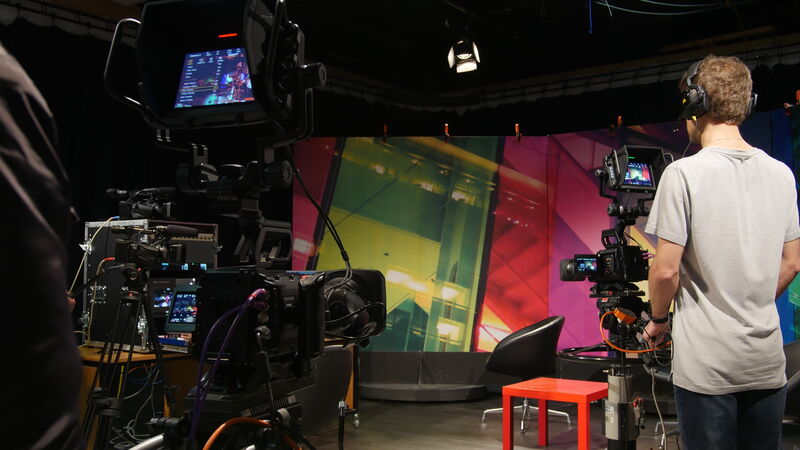Professional Programmes - Full Time |
1 Year |
| Fees and Funding | |
Application Deadline: |
02nd August 2024
For EU & those living on the island of Ireland (Late applications may be considered). |
|
31st May 2024
For non EU |
|
Course Start Date: |
21st September 2024 |
| Get info | Apply now |
Introduction
Students are trained by media professionals in the management and technical aspects of media production
Description
Non-EU students should contact cmmadmissions@spcm.ie for guidance on their application.
The Postgraduate Diploma in Christian Communication and Media Practice is delivered through Kairos Communications Ltd. Founded almost 40 years ago, the Kairos moved into television broadcasting and has created hundreds of hours of religious, social and corporate productions for a diverse range of clients and companies.
Kairos Communications operates its training, teaching and production work from a suite of offices and purpose built facilities in its buildings on the Moyglare Road opposite Maynooth University’s North Campus. You will have access to a large array of practical resources, both in terms of camera equipment, sound devices, computer hardware and software. All equipment is sourced and serviced by our onsite technical personnel.
The company has a large television studio with a production gantry, lighting and engineering room and audio control room and also has a full broadcast spec multi camera Outside Broadcast Unit, a radio studio complex, a large seminar room, classrooms and two fully equipped computer labs.
The Postgraduate Diploma in Christian Communication and Development is awarded on the successful completion of one year’s full-time study.
Aims and Objectives
- The aim of the Postgraduate Programme is to deliver a comprehensive syllabus of media skills, with specific regard to religious and social affairs.
- It is designed to equip a student with practical competencies in key areas required for working in a contemporary professional media environment.
- The programme is structured to engage with religious and social affairs through the medium of the media. To this end, it will offer practical, relevant and expert training in mainstream and new technologies, while attentive to the cultural needs and priorities of religious and social affairs.
Students are trained by media professionals in the management and technical aspects of media production so that they will carry from the course immediately usable technical skills. In addition, they are introduced to theoretical and practical perspectives, which will equip them with the conceptual tools and the framework of knowledge to develop a critical understanding of the context of media, their operations and their applications.
PROGRAMME LEARNING OUTCOMES
On successful completion of the programme, the graduate should be able to:
Knowledge
Breath
Demonstrate an analytic knowledge of the constitutive elements of media production.
Display a knowledge of theories of communication, including the philosophy, theology, ethics and spirituality of communication
Kind
Engage sensitively and critically with religious and social affairs, by way of the process of media production and theoretical reflection.
Identify self-understandings of religious communities and trends with society.
Know-How and Skill
Range
Equip students with an industry entry level competence in media technologies, both mainstream and digital.
Identify, gather and analyse material from a specified range of sources.
Selectivity
Generate mainstream and social media products on specific themes.
Demonstrate competence in technical and production skills.
Communicate values and ideas to contemporary audience in a creative and innovative manner.
Critically reflect on the context of media, their operations and applications.
Demonstrate a capacity for creative innovation in traditional or contemporary media forms.
Competence
Role
Develop critical evaluation skills in relation to mass media.
Initiate and complete variety of media productions in a leadership capacity or working collaboratively as part of a team.
Learning to learn
Complete learning tasks purposefully, ethically and to professional standards.
Collaborate effective within groups in completing projects.
Show a capacity for reflective practice
Insight
Value the subjects at the centre of media production.
Articulate the ways in which theory and practice may be integrated.
Critically appraise practices and identities of religions and society.
Critically appraise media representations and practice from the point of view of ethics, professional practice and the law.
Assessment
The assessment is continuous and is designed to facilitate learning in both knowledge and skills areas and to provide independent validation of standards achieved appropriate to the course objectives and in line with national and international norms.
The course includes a taught element, with lectures and major essays which will be due for submission at the end of the first and second semesters, and the completion of several production projects throughout the year.
The taught element of the course will account for a total of 60 credits, with the academic modules providing 15 credits and the production projects accounting for 45 credits.
Students will take a total of 60 credits, 30 credits in both semesters one and two. All modules are compulsory. All taught modules will be evaluated through continuous assessment and/or by production or essay assignments at the end of each semester.
Credit Weighting:
7.5 Credits per Major module
5 Credits per Mid module
2.5 Credits per Mini Module
Career Outcomes
Taught by media professionals, the program will provide students with a strong practical knowledge of a wide range of media practice such as camerawork, editing, TV Studio, Live Radio production, presentation and social media engagement. Participants will learn through intensive hands-on experience, and will develop technical and practical skills which will be highly transferable in the ever changing employment market.
ARTICULATION WITH OTHER PROGRAMMES/PROGRESSION OPPORTUNITIES
On completion, students may progress to Level 9 programmes on the National Qualifications Framework. QQI validation also allows for recognition in Europe and beyond.
Course Structure
Application Requirements
Admission Requirements
Grade 2:2 in a primary degree or equivalent qualification, or a suitable professional qualification with experience in the field of media or theology. Applications are also welcome from candidates who do not fulfill the above requirements but who have a demonstrable interest in media, theology, or social justice, following an interview.
(Code - MU526)
Contact Kairos Communications:
Address: Moyglare
Road, Maynooth, Co. Kildare, Ireland.
Tel: +353 (1) 6286007
Fax: +353 (1) 6286511
Email: info@kairoscomms.ie
Website: kairoscomms.ie

If you live outside Ireland, check out our dedicated area for international students.
Let’s talk
For Undergraduate queries: email admissions@spcm.ie.
For Postgraduate queries: email pgadmissions@spcm.ie.
For The Centre for Mission & Ministries queries, email: cmmadmissions@spcm.ie.

